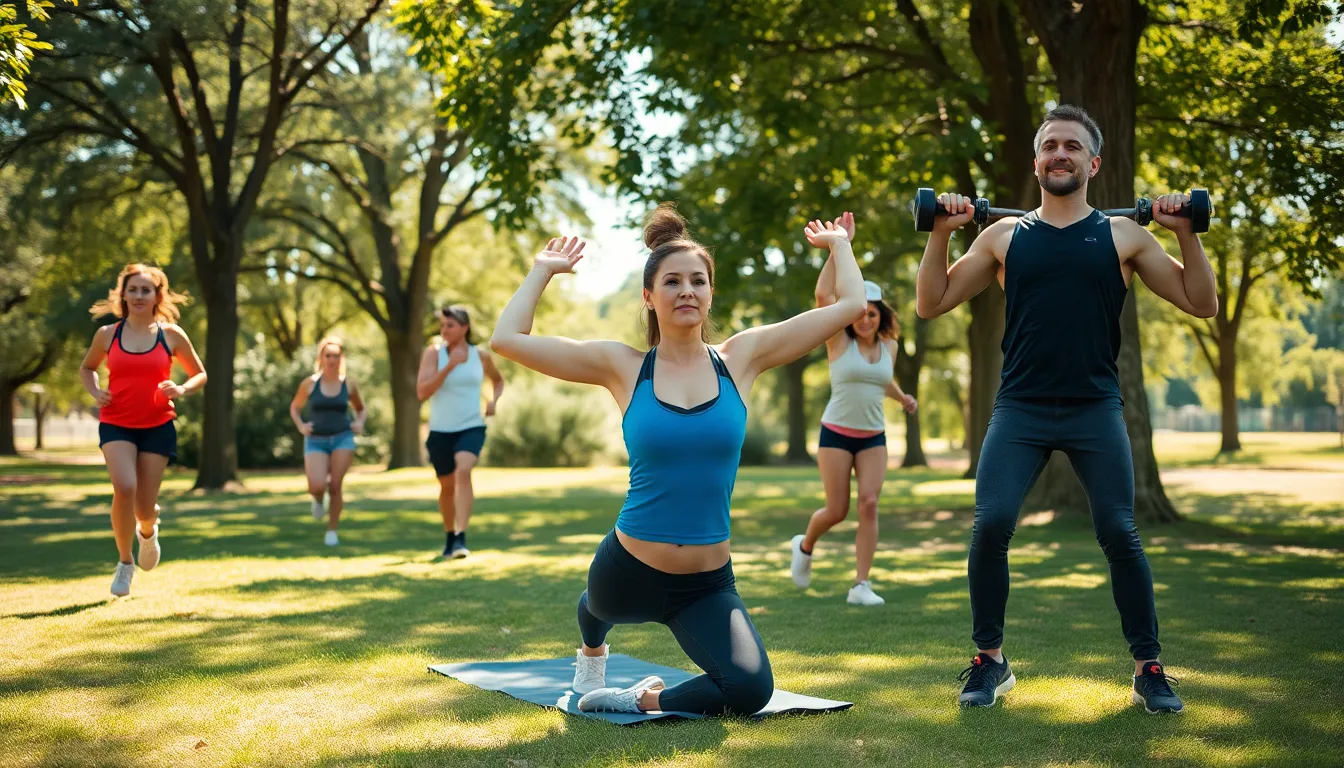In a world where the couch often calls louder than the gym, physical fitness can feel like a distant dream. But fear not! Getting fit doesn’t have to mean sacrificing your sanity or your love for pizza. With the right mindset and a sprinkle of humor, anyone can embark on a journey to better health.
Table of Contents
ToggleUnderstanding Physical Fitness
Physical fitness encompasses various attributes that contribute to overall health and well-being. Engaging in physical activities builds endurance, strength, flexibility, and cardiovascular health.
Definition of Physical Fitness
Physical fitness refers to the body’s ability to perform daily activities efficiently without excessive fatigue. It includes components such as muscular strength, cardiovascular endurance, flexibility, and body composition. These elements work together to enable individuals to undertake tasks with ease. A fit person can adapt to physical demands, ensuring productivity in work and play.
Importance of Physical Fitness
Importance of physical fitness lies in its positive impact on health. Regular engagement in physical activity reduces the risk of chronic diseases such as diabetes, heart disease, and obesity. Maintaining fitness also enhances mental well-being by decreasing symptoms of anxiety and depression. Furthermore, strong physical fitness improves energy levels and boosts confidence. A commitment to fitness leads to healthier lifestyle choices and increased longevity. The blend of these benefits supports individuals in leading fulfilling lives.
Components of Physical Fitness

Physical fitness consists of several key components that contribute to overall health. Understanding these components helps individuals focus on specific areas of improvement.
Cardiovascular Endurance
Cardiovascular endurance refers to the ability of the heart, lungs, and blood vessels to supply oxygen during prolonged physical activity. Individuals can improve this by engaging in activities such as running, cycling, or swimming. Regularly participating in these exercises enhances stamina and reduces fatigue. Health experts recommend at least 150 minutes of moderate aerobic activity each week. Developing strong cardiovascular endurance contributes to better overall health and lowers the risk of heart disease.
Muscular Strength and Endurance
Muscular strength encompasses the maximum amount of force a muscle can produce. Engaging in weightlifting or bodyweight exercises enhances individual strength. Muscular endurance, on the other hand, relates to how long muscles can perform a task before tiring. Individuals can boost this through circuit training or activities like rowing. Experts advise incorporating strength training at least two days a week. Better muscular strength and endurance positively impact daily activities and sports performance.
Flexibility
Flexibility describes the range of motion in joints and muscles. Increased flexibility prevents injuries and improves posture. Activities like yoga or stretching routines promote flexibility. Consistent practice enhances the elasticity of muscles and connective tissues. It’s beneficial to include flexibility exercises at least two to three times a week. Enhanced flexibility contributes to better overall physical fitness and aids in recovery from intense workouts.
Body Composition
Body composition refers to the proportion of fat and lean mass in the body. A healthy body composition typically includes a lower percentage of body fat coupled with higher lean muscle mass. Individuals can manage body composition through a balanced diet combined with regular exercise. Nutritional choices and physical activity directly affect body composition outcomes. Tracking changes in body composition can guide individuals toward healthier lifestyle choices, fostering long-term fitness success.
Benefits of Maintaining Physical Fitness
Maintaining physical fitness offers numerous advantages that enhance overall well-being. Several key benefits include physical health, mental well-being, and enhanced longevity.
Physical Health
Regular exercise improves cardiovascular health significantly. It strengthens the heart and boosts circulation, reducing the risk of heart disease. Engaging in consistent physical activity promotes weight management, helping individuals maintain a healthy body composition. Strong muscles and increased endurance contribute to better functional fitness, supporting daily activities. Reduced risk of chronic diseases, such as diabetes or hypertension, further underscores the importance of an active lifestyle.
Mental Well-Being
Physical fitness positively influences mental health. Exercise releases endorphins, known as “feel-good” hormones, which alleviate stress and anxiety. Improved mood and reduced symptoms of depression often result from regular physical activity. Increased self-esteem arises through achieving fitness goals, fostering a sense of accomplishment. Additionally, maintaining an active lifestyle enhances cognitive function, leading to sharper focus and better memory.
Enhanced Longevity
Engagement in physical fitness correlates with increased life expectancy. Individuals who regularly exercise exhibit higher levels of vitality, contributing to a more fulfilling life. The World Health Organization highlights that a physically active lifestyle decreases mortality rates significantly. Healthier aging often results from consistent physical activity, reducing the risk of age-related illnesses. Thus, prioritizing fitness offers a pathway to longevity and improved quality of life.
Ways to Improve Physical Fitness
Improving physical fitness involves a combination of structured exercise, proper nutrition, and lifestyle adjustments. Each aspect plays a vital role in overall health and well-being.
Exercise Regimens
Developing a consistent exercise regimen enhances physical fitness significantly. Engaging in aerobic activities like running, cycling, or swimming increases cardiovascular endurance. Incorporating strength training at least twice a week builds muscle and support fat loss. Group fitness classes foster a motivating environment and provide social interaction, which can enhance accountability. Finding an exercise routine that excites an individual contributes to long-term adherence and enjoyment. Alternating workouts prevents boredom and helps in building a well-rounded fitness profile.
Nutrition and Diet
A balanced diet significantly impacts physical fitness and performance. Consuming whole foods like fruits, vegetables, lean proteins, and whole grains ensures adequate nutrient intake. Hydration is equally crucial, as proper water consumption maintains energy levels and supports recovery. Planning meals and snacks around workouts can enhance performance and muscle recovery. Observing portion sizes helps in managing weight effectively. Tailoring dietary choices to balance energy expenditure can result in better body composition.
Lifestyle Changes
Implementing lifestyle changes can amplify the effects of fitness efforts. Prioritizing sleep sets the foundation for recovery and energy. Limiting sedentary behaviors such as extended screen time encourages more active living. Mindful practices, including meditation or yoga, help reduce stress and improve mental health. Setting achievable fitness goals alongside initiating new hobbies promotes a sense of accomplishment. Engaging in outdoor activities or team sports fosters a greater connection to community and nature. Embracing these changes supports individuals in maintaining a healthy lifestyle.
Embracing physical fitness is a journey that enriches life in countless ways. By focusing on key components like cardiovascular endurance, muscular strength, and flexibility, individuals can cultivate a well-rounded approach to health. The benefits extend beyond physical appearance, enhancing mental clarity and emotional resilience.
Adopting a positive mindset and integrating enjoyable activities into fitness routines makes the process sustainable. With the right balance of exercise, nutrition, and lifestyle changes, anyone can thrive in their pursuit of better health. The path to fitness isn’t just about reaching a destination; it’s about enjoying the ride and discovering a more vibrant, fulfilling life.





